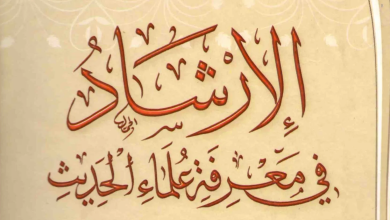Imam Ibn Rajab al-Ḥanbalī (d. 795 AH) on the night of Mid-Sha’ban
The following is from a well known Hanbali scholar known as Imam Zayn al-Dīn Abū al-Faraj ʿAbd al-Raḥmān ibn Aḥmad ibn Rajab al-Ḥanbalī (d. 795 AH) from his work known as Laṭāʾif al-Maʿārif fīmā li-Mawāsim al-ʿĀm min al-Waẓāʾif (The Subtle Insights of Knowledge Regarding the Duties of the Seasons of the Year).1
Imām Ibn Rajab al-Ḥanbalī said in his Laṭāʾif al-Maʿārif:
The middle-night of Sha’bān was highly regarded by the Successors [tābiʿūn] from among the people of Syria, such as Khālid ibn Maʿdān, Makḥūl, Luqmān ibn ʿĀmir and others. They would honour it and strive in worship during it. From them, people learned of its virtue and veneration. It has been said that they received Israelite traditions [āthār isrāʾīliyyah] regarding it. When this became well-known from them in various lands, people differed concerning it. Among them were those who accepted it from them and agreed with them in venerating it – including a group of the devout worshippers from Basra and others – while most scholars from the Hijaz denied it, including ʿAṭāʾ and Ibn Abī Mulaykah. ʿAbd al-Raḥmān ibn Zayd ibn Aslam transmitted this from the jurists of Madina, and it is the position of the followers of Mālik and others – and they said all of this is an innovation [bidʿah].
The scholars of Syria differed on how to observe it, holding two views:
First: That it is recommended to observe it in congregation in the masjids. Khālid ibn Maʿdān, Luqmān ibn ʿĀmir and others would wear their best clothes, use perfume and kohl (on the eye area), and stand in prayer in the masjid that night. Isḥāq ibn Rāhawayh (teacher of al-Bukhari the author of the famous Sahih collection) agreed with them on this and said regarding praying it in congregation in the masjids: “This is not an innovation.” This was transmitted from him by Ḥarb al-Kirmānī (student of Ahmad ibn Hanbal) in his “Masāʾil.”
Second: That gathering in the masjids for prayer, storytelling and supplication is disliked [makrūh], but it is not disliked for a person to pray individually. This is the position of al-Awzāʿī, the leader of the people of Syria, their jurist [and scholar]. This is the more correct view, Allah willing.
It has been reported that ʿUmar ibn ʿAbd al-ʿAzīz wrote to his governor in Basra: “You must observe four nights of the year, for Allah pours forth mercy abundantly in them: the first night of Rajab, the mid-night of Sha’bān, the night of Fiṭr, and the night of Aḍḥā.” However, there is doubt about its authenticity from him.
Al-Shāfiʿī said: “We have been informed that supplications are answered on five nights: the night of Friday, the two Eid nights, the first of Rajab, and mid-Sha’bān.” He said: “I recommend all that I have mentioned on these nights.” (This is in his Kitab al-Umm (1/264))
No statement is known from Imam Aḥmad regarding the mid-night of Sha’bān. Two views can be derived regarding the recommendation of standing in prayer during it based on the two narrations from him concerning standing in prayer on the night of Eid. In one narration, he did not recommend praying it in congregation because it was not transmitted from the Prophet ﷺ and his companions, while in another narration he recommended it due to the practice of ʿAbd al-Raḥmān ibn al-Aswad ibn Yazīd, who was from among the Successors. Similarly, regarding standing in prayer on mid-Sha’bān night, nothing is established from the Prophet ﷺ or his companions, but it is established from a group of the Successors from among the leading jurists of Syria.
It was reported from Kaʿb that he said: “Indeed Allah sends Jibrīl, peace be upon him, to Paradise on the mid-night of Sha’bān and commands it to be adorned, saying: ‘Indeed Allah has freed from the Fire on this night of yours a number equal to the stars of the sky, the days and nights of the world, the leaves of trees, the weight of mountains, and the number of sands.'”
Saʿīd ibn Manṣūr narrated: Abū Maʿshar told us, from Abū Ḥāzim and Muḥammad ibn Qays, from ʿAṭāʾ ibn Yasār who said: “There is no night after the Night of Power [Laylat al-Qadr] more virtuous than the mid-night of Sha’bān. Allah, Mighty and Majestic, descends to the lowest heaven and forgives all His servants except for a polytheist [mushrik] or one bearing grudges [mushāḥin] or one who severs family ties.”
O you who have been freed from the Fire on this night! Congratulations to you for this magnificent gift. And O you who have been turned away on it! May Allah compensate your calamity for it is indeed a great calamity.
[Poetry translation:]I weep for myself, and it is my right to weep
For I have no doubt about the waste of my life
If I say that in my deeds I am doing good
Then in saying so I am surely lying
The nights of Sha’bān and its mid-night
In what state will they be recorded in my scroll?
By my life, it is my duty to maintain my supplication
Perhaps the God of creation will grant release
- It befits the believer to devote himself on that night to the remembrance of Allah the Most High and supplication for forgiveness of sins, concealment of faults, and relief from distress, and that he should precede this with repentance, for Allah accepts the repentance of whoever repents on this night.
Stand in prayer on the noble mid-night
For the most noble of this month is its mid-night
How many youth have spent the mid-night heedless
While their death warrant was written during it
So, hasten to do good before its passing
And beware of death’s sudden arrival in it
Fast its day for Allah and maximize your hope in Him
To achieve His kindness in times of distress
It is incumbent upon the Muslim to avoid sins that prevent forgiveness and acceptance of supplication on that night. It has been reported that these are: polytheism [shirk], murder, and adultery. These three are the greatest sins in Allah’s sight, Mighty and Majestic, as in the authentic hadith of Ibn Masʿūd where he asked the Prophet ﷺ: “Which sin is greatest?” He said: “That you set up a rival to Allah while He created you.” He asked: “Then which?” He said: “That you kill your child fearing that he will eat with you.” He asked: “Then which?” He said: “That you commit adultery with your neighbour’s wife.” Allah the Most High sent down confirmation of this: “And those who do not invoke with Allah another deity or kill the soul which Allah has forbidden except by right or commit unlawful sexual intercourse” [Al-Furqān: 68].
Among the sins that prevent forgiveness is also bearing grudges [shaḥnāʾ], which is a Muslim’s hatred for his brother due to his own desires. This also prevents forgiveness during most times of forgiveness and mercy, as in Ṣaḥīḥ Muslim from Abū Hurayra in a raised tradition [marfūʿ]: “The gates of Paradise are opened on Monday and Thursday, and every servant who does not associate anything with Allah is forgiven, except for a man who has enmity between himself and his brother. It is said: ‘Wait for these two until they reconcile.'”
Al-Awzāʿī interpreted this preventing grudge [shaḥnāʾ] as referring to one who harbours resentment against the companions of the Prophet ﷺ. There is no doubt that this type of grudge is a greater crime than the mutual antagonism between peers.
From al-Awzāʿī, he said: The bearer of grudges [mushāḥin] is every innovator who has separated from the community over it.
Similarly, Ibn Thawbān said: The bearer of grudges [mushāḥin] is: One who abandons the Sunnah of his Prophet ﷺ, criticizes his community, and sheds their blood.
This type of grudge – meaning: the grudge of innovation [bidʿah] – necessitates criticizing the Muslim community and making permissible their blood, wealth, and honour, like the innovations of the Khawārij and the Rawāfiḍ and their like.
Therefore, the best of deeds is having a heart free from all types of grudges, and the best of these is being free from the grudges of the people of desires and innovations that lead to criticizing the predecessors of the community, hating them, bearing grudges against them, and believing in declaring them disbelievers or innovators or misguided. Following this is having a heart free from bearing grudges against Muslims in general, wanting good for them, giving them sincere advice, and loving for them what one loves for oneself. ([End of quote]
Footnote:
- The Arabic text was sourced from (pp. 327-330) here – https://shamela.ws/book/1151/322#p1): ↩︎






